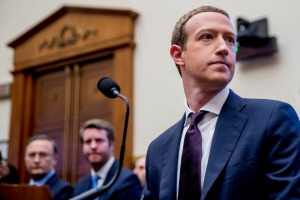Featured Image Source
Just a day after ‘60 Minutes’ aired an explosive interview with Facebook whistleblower Frances Haugen, the social site went down.
The October 4 outage, which affected Facebook, Instagram and WhatsApp, left billions of the platforms’ users unable to get online.
Not even a week later, Facebook seemed to be down again.
Downdetector tweeted: “User reports indicate Facebook is having problems since 7:40 AM EDT.”
User reports indicate Facebook is having problems since 7:40 AM EDT. https://t.co/8wgYQLKxCu RT if you’re also having problems #Facebookdown
— Downdetector (@downdetector) October 11, 2021
“It’s currently unclear what is causing the issues or how many people are affected,” according to The U.S. Sun.
Yesterday was the third time in a week that Facebook has faced widespread outages.
Facebook blamed the Oct. 4 outage on “faulty configuration change” on its routers, but one expert said “an internal staff error” took the site off the internet.
Facebook boss Mark Zuckerberg apologized in a FB post (lol), saying, “Sorry for the disruption today.”
Zuckerberg had to halt company stock, and is estimated to have lost $7 billion in net worth in a matter of hours.
Is it a coincidence? Maybe. But maybe not.

Facebook has been under scrutiny for privacy issues and allowing misinformation to be posted in the past.
But new leaked documents show the site “misleading the public on progress against hate speech, violence, misinformation,” according to Haugen.
Last month, an anonymous former Facebook employee, now known to be Haugen, filed complaints with federal law enforcement.
The complaints stated that Facebook’s own research shows that it “amplifies hate, misinformation and political unrest — but the company hides what it knows.”
Another complaint asserts that Instagram, which is owned by Facebook, causes harm to teenage girls.
Who Is Frances Haugen?
Haugen was formerly a product manager on Facebook’s civic integrity team, which focused on election issues.
“Facebook’s mission is to connect people all around the world,” said Haugen. “When you have a system that you know can be hacked with anger, it’s easier to provoke people into anger. And publishers are saying, ‘Oh, if I do more angry, polarizing, divisive content, I get more money.’ Facebook has set up a system of incentives that is pulling people apart.”
Whistleblower Slams Facebook
In April, Haugen quit her job at Facebook and contacted Whistleblower Aid, reported the Wall Street Journal in a story published Sunday.
We’re proud to have worked with Frances throughout this process to ensure she could share her concerns with regulators and lawmakers. If you want to ensure she has the support she needs for the fight ahead, support her GoFundMe: https://t.co/NkvqmAEWCv https://t.co/Fru78jjftE
— Whistleblower Aid (@wbaidlaw) October 3, 2021
The nonprofit organization says it provides legal aid to “individuals who, lawfully, report government and corporate law breaking.”
Haugen told ‘60 Minutes’ how Facebook put growth above social responsibility, calling the situation “substantially worse” than on other social media platforms.
She also said that she found it “horrifying” what “Facebook is in other countries.”
Outside of the U.S., Haugen said, “Each new language costs more money, but there’s fewer and fewer customers.”
She explained that “Facebook gets less for its money when it trains moderators and AI in smaller countries with fewer users. So instead of building expensive infrastructure,” she said, “Facebook lets misinformation spread.”
“In other parts of the world, that misinformation is directly leading to people dying,” Haugen said.
Facebook’s Response
On behalf of Facebook, Lena Pietsch, their director of policy communications, responded to 60 Minutes’ report, “The Facebook Whistleblower,” with the following statements:
“Every day our teams have to balance protecting the right of billions of people to express themselves openly with the need to keep our platform a safe and positive place. We continue to make significant improvements to tackle the spread of misinformation and harmful content. To suggest we encourage bad content and do nothing is just not true.”
On the claim that internal research showed that the company is not doing enough to eradicate hate, misinformation, and conspiracy:
“We’ve invested heavily in people and technology to keep our platform safe, and have made fighting misinformation and providing authoritative information a priority.
“If any research had identified an exact solution to these complex challenges, the tech industry, governments, and society would have solved them a long time ago. We have a strong track record of using our research — as well as external research and close collaboration with experts and organizations — to inform changes to our apps.”
You can read the rest of Facebook’s response to all of Haugen’s claims here.
Will Facebook Change Course?
The conditions at Facebook aren’t getting better, Haugen said on an episode of The Journal podcast, which went live on Sunday.
“The thing I want everyone to know is Facebook is far, far more dangerous than anyone knows,” she said, “and it is getting worse.”

Were you annoyed by the Facebook outage or has your opinion of the social site changed since Frances Haugen came forward? Let us know below!
For More Spotlights On Current Events, Check Out These Articles:
Thousands Show Up To Women’s Marches To Support Reproductive Rights




